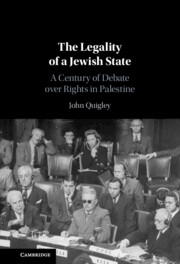Book contents
- The Legality of a Jewish State
- The Legality of a Jewish State
- Copyright page
- Contents
- Figures
- Preface
- United Nations Entities
- Abbreviations
- Frontispiece
- Part I Battalions or Barristers
- Part II A Pair of Godfathers
- Part III A Flight from Justice
- Part IV From the Ashes of War
- Part V Whose State?
- Part VI Jewish Statehood on the Ground
- 22 Was the Declaration of a Jewish State Valid?
- 23 Was Israel the Victim of Arab Aggression?
- 24 Was Israel Liable for the Flight of the Palestine Arabs?
- 25 Was Israel Liable for Not Repatriating the Palestine Arabs?
- 26 Did Israel Go Too Far?
- 27 Was Israel a Peace-Loving State?
- Part VII Legitimacy in the New Century
- Notes
- Select Bibliography
- Index
27 - Was Israel a Peace-Loving State?
from Part VI - Jewish Statehood on the Ground
Published online by Cambridge University Press: 09 December 2021
- The Legality of a Jewish State
- The Legality of a Jewish State
- Copyright page
- Contents
- Figures
- Preface
- United Nations Entities
- Abbreviations
- Frontispiece
- Part I Battalions or Barristers
- Part II A Pair of Godfathers
- Part III A Flight from Justice
- Part IV From the Ashes of War
- Part V Whose State?
- Part VI Jewish Statehood on the Ground
- 22 Was the Declaration of a Jewish State Valid?
- 23 Was Israel the Victim of Arab Aggression?
- 24 Was Israel Liable for the Flight of the Palestine Arabs?
- 25 Was Israel Liable for Not Repatriating the Palestine Arabs?
- 26 Did Israel Go Too Far?
- 27 Was Israel a Peace-Loving State?
- Part VII Legitimacy in the New Century
- Notes
- Select Bibliography
- Index
Summary
Issues of legality were discussed when the Provisional Government of Israel applied for membership for Israel in the United Nations. Membership requires that an entity be a state, and that it be peace-loving. An initial application made in December 1948 was rejected. An application made in March 1949 gained approval from the Security Council, over objection by Britain, in a resolution which stated that Israel was a peace-loving state. That application then moved to a committee of the General Assembly, which conducted hearings that focused on the peace-loving criterion. Israel’s representative was asked whether Israel claimed sovereignty in Jerusalem, in light of the fact that the General Assembly’s resolution on partition had contemplated that Jerusalem would fall under the sovereignty of neither the Arab nor the Jewish state. Israel’s representative replied that the status of Jerusalem remained an international issue. On repatriation, Israel’s representative said that this was an internal matter for Israel. The committee reported favorably on admission, noting the representations made by Israel’s representative. The General Assembly then admitted Israel to membership in a resolution that recited that Israel was a peace-loving state.
- Type
- Chapter
- Information
- The Legality of a Jewish StateA Century of Debate over Rights in Palestine, pp. 228 - 238Publisher: Cambridge University PressPrint publication year: 2021

